![]()
The Words of the Nonami Family
|
|
The Words of the Nonami Family |
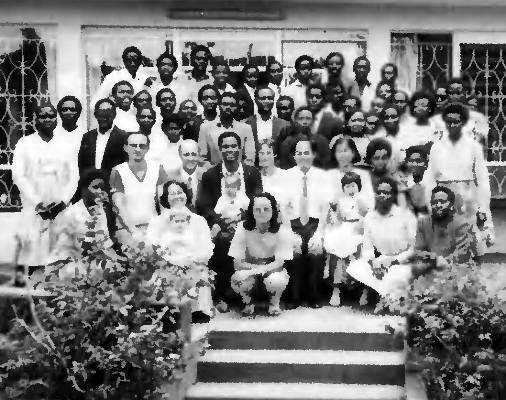
Members
at our church headquarters. Mr. Mitsuaki Nonami sits center front.
Mitsuaki Nonami is the national leader of Kenya and the regional leader of East Africa. He came to this region in 1981 and took his leadership position a few years later.
Is this really Africa?" This is a remark we often hear when we take visitors from abroad to downtown Nairobi. With many high rise buildings and beautiful views, Nairobi is an international city whose role has recently become more important among African nations for business, conferences, communications, and other international affairs. Even the climate of Nairobi, contrary to what people imagine about Africa, is cool and comfortable throughout the year. Under these blessed circumstances, Kenya's 100 Unification Church members feel their responsibility deeply and are working hard to fulfill their goals.
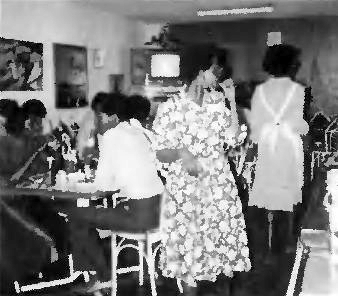
The
Hamburger House brings in a lot of business.
Our headquarters in Nairobi is in a middle- class residential area two miles from the center of the city. Happy voices, prayers, and the singing of brothers and sisters can always be heard there, and recently, the center has become more lively and crowded while our half-day and two-day weekend workshops are going on. We have been warmly accepted by our neighbors, too, since most of them have been introduced to the Unification movement through our home church activities.
At the start of this year, we began activities for home members. There was skepticism at first toward the home members' program. Because we had to give so much attention to the work of full-time members, the home members' meetings seemed to be less important. However, as the number of full-time center members quickly increased, along with financial and other problems, the need for an organization of home members became apparent. Also at that time many married couples started to join the family. Some home members quickly began attending every morning service and every evening and weekend activity. New home members bring their workmates and families with them and introduce them to our movement, and in this way they actually have an advantage over the center members in witnessing opportunities. Although the home members' group numbers only about 50, it is becoming one of the brightest aspects of our movement in Kenya, and one of the main forces behind our activities.
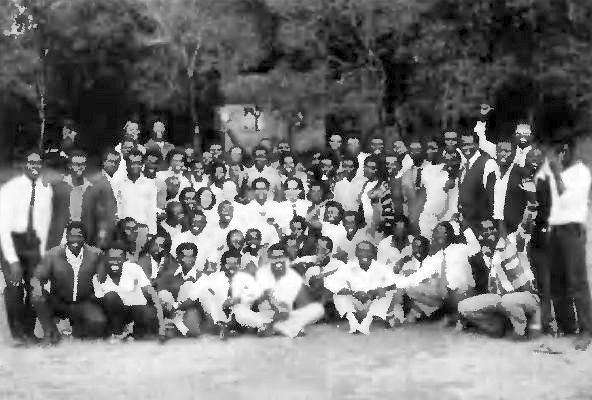
A
40-day workshop in Nairobi in 1985.
Kenyatta Avenue, one of the busiest streets in downtown Nairobi, is the place where brothers and sisters do most of the witnessing, usually between 1:00-2:00 p.m. and 4:30-7:00 p.m., when people are not in their offices. At the busiest times, the streets in the downtown area are filled with people just as in any other big city in the world.
At lunch hour, you can see street preaching everywhere; Kenya is indeed a strong Christian country. People never ignore these street preachers; they gather and listen seriously. Recently, our members also began to give
Principle lectures in the street. People have been coming to listen, and when we call for prayer after the lecture, they draw close and join in with us.
We have a lecture room in one of the buildings on Kenyatta Avenue, where we invite people we meet on the street to Principle lectures during lunch hours and in the evenings. Many of our members joined the family from this lecture room.
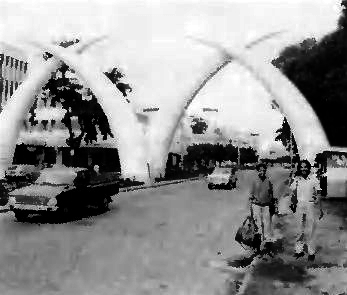
In
Mombasa, Kenya's second largest city.
Every Thursday at our headquarters center we hold a Weekly Forum during which testimonies, speeches, and an introduction to the workshop are presented. Most of the guests are those who were witnessed to on the street and attended lectures at the downtown lecture room. Professors or prominent people who have already attended our seminars and are familiar with the Unification movement are often invited as main speakers at these forums.
Not only new guests, but also home members and center members enjoy these programs. Through both light and serious discussions, new guests and home members are encouraged to continue coming to the center and attending other programs. We also offer half-day workshops on Saturday afternoons for those who cannot come for the main two- day weekend. In most cases, a guest who has attended one of our programs comes over to the center again to study the Principle by video or by lecture. Today, most of the lectures are given by local members, many of whom are very good. This is encouraging, because most of the core members in Kenya joined after the present missionaries came in 1981. Though they are young, they have good potential to build a firm foundation.
This year on August 9 we had a surprise three-day visit from Rev. Kwak. News of his intended trip had reached us just one week before, and our joy at receiving him was great, because we had prepared to receive him once before in 1983, but his trip had been cancelled at the very last minute. Now, three years later, our hopes were substantially realized.
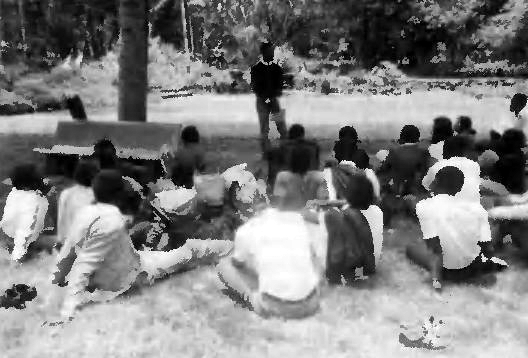
At
our holy ground in Nairobi.
On Saturday August 9, in the late evening, members gathered at the center and began singing to welcome Rev. Kwak. When he arrived, he spoke to us deeply for about an hour, although he hadn't even planned on speaking that night. The next morning after Pledge service and also at the Sunday service Rev. Kwak gave us wonderful internal guidance, which greatly uplifted our hearts.
At the end of his visit, we determined that we would gain 2,000 members by the end of 1986. When he first asked how many members we could gain by the end of the year, he said our tentative goal was too small, and we were urged to discuss it more. Finally we made a determination to get 2,000 members by the end of this year and 8,000 by the end of 1987.
Once our brothers and sisters made this determination, they began working very hard. A four-hour prayer vigil every day has been voluntarily organized and will continue until our goal is reached. Center members, home members, and members working in business or CARP have all taken responsibility for different hours of the prayer vigil. Initially, the witnessing results during this special condition were low, and it was difficult to get even five new guests for a weekend workshop. However, as it became more and more difficult, our members became more and more serious. Gradually now, the number of guests is increasing, and we can actually see the hopes of fulfilling our goal. We also began giving Principle lectures in various colleges and technical schools. Attendance at each of them has been over 100.
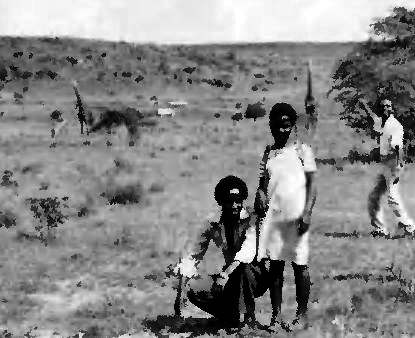
Members
on an outing in the plains of Kenya.
Rev. Kwak also spoke to the CARP members. They determined to bring many new CARP members by the end of this year. CARP, began in Kenya two years ago. So far over 100 students have attended two-day CARP workshops.
Our activities take place not only in Nairobi, but also in the second-largest city, Mombasa, where Mr. and Mrs. Bernard Lepercq are pioneering with several local members. Mombasa is a port city and the center of the fishing industry. It is one of the oldest cities in Africa, and its culture is a mix of Swahili, Arabic, Portuguese, and British influence. Today Mombasa, with its hundreds of international hotels, has become a resort frequented by vacationing Europeans. Members are also pioneering in the thin:-largest city, Kisumu, located on Lake Victoria and important for its fresh-water fishing.
Fundraising activities take place out of the Nairobi center; fundraising is, as everywhere, vital for our activities. The recently opened Hamburger House is also a hopeful venture.
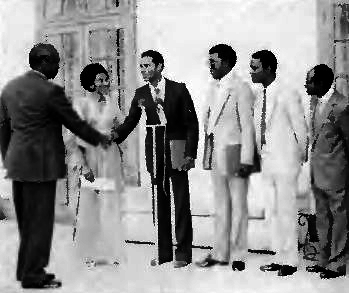
Representatives
of AED are received at the state house by President Daniel Arap Moi.
Our national social service organization in Kenya, the Association for Education and Development (AED), is quite well known. AED is supported by a variety of people -- Christians, Muslims, and Indians (Asians). Two years ago, when Africa suffered from drought and famine, Kenya's president, Daniel Arap Moi, founded the National Famine Fund and called for national cooperation. At that time, AED offered to give a large donation to the fund. We were invited to the state house and directly handed the donation to the president. Three newspapers, radio, and TV carried news of the event throughout the country. We have come to be known as the group that helps orphanages, offers scholarships, and organizes educational programs, seminars, sports festivals and arts festivals. Through AED activities, interdenominational and intercultural unity is gradually being achieved in Kenya, and AED is becoming one of the most popular social service organizations in the country.
A three-day Introductory Seminar on the Unification Movement (ISUM) was held in October 1985 at the Mombasa Beach Hotel. We had over 40 participants; most of them were scholars and some were high government officials or politicians. Our brother Kenneth Gray gave the Principle lectures. Bright summer sunshine and the beautiful blue of the Indian Ocean helped open the people's hearts, and a wonderful atmosphere was created. One scholar who had already attended several ISUMs abroad said that this was the best one he had been to. Through this seminar, we could open many new doors to Kenyan society.
After the Mombasa seminar, we began receiving attention from many groups and organizations in the country and were asked to hold more seminars. Immediately, we organized a half-day introductory seminar at one of the international hotels in town. Even some of the scholars took it upon themselves to give Principle lectures. Finally, the National Council of Churches of Kenya (NCCK), a Protestant organization, invited us to introduce the Unification movement to Christian ministers. So a seminar was held February 19-22, 1986. Twelve ministers attended and were very inspired by the lectures. NCCK is also inviting us to attend their own seminars.
Through the activities of the Unification movement, I can see that God's providence is moving forward, and we can have great hope for the future of Kenya.